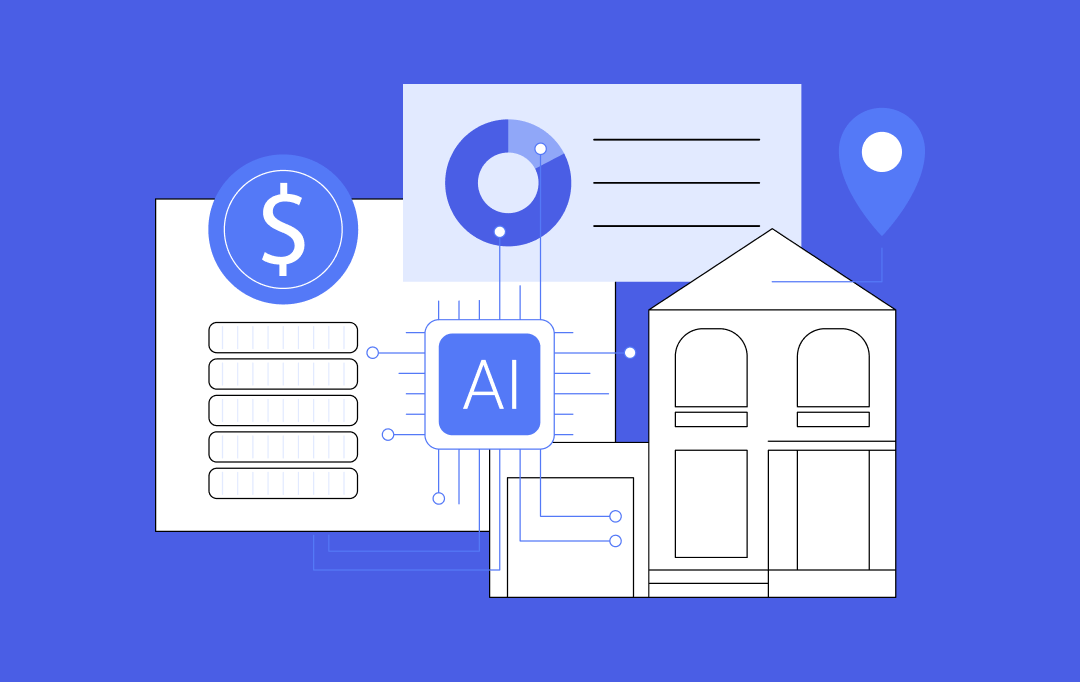- Understanding AI in Insurance
- Key Benefits of AI in the Insurance Industry
- Streamlined Claim Processing
- Assessing Risk
- Fraud Detection and Prevention
- Claims Reporting
- Insurance Claims Management and Investigation
- Improved Routine Operations
- Improved Loss Estimation
- AI in Insurance Use Cases
- Lemonade
- ZestFinance
- Nauto
- Metromile
- Cytora
- Top AI-driven Innovations and Trends Transforming the Insurance Sector
- Hyper-Personalization
- Data Explosion from Connected Devices
- Extended Reality
- Data Precision
- Overcoming AI Implementation Challenges in Insurance With Solutions and Strategies
- Integration with Legacy Systems
- Regulatory Compliance
- Data Quality and Integration
- Data Privacy and Security
- How Appinventiv Can Help Harness the Power of AI to Achieve Your Goals
- FAQs
Artificial Intelligence (AI) has emerged as a powerful technological marvel that has unraveled a world of possibilities for every industry. The insurance industry is in no way indifferent to AI. AI in insurance has massively transformed risk management, underwriting policies, and other traditional insurance practices. The impact of AI in the insurance sector has been extraordinary, empowering insurers worldwide to embrace new practices and achieve unprecedented efficiency.
As per Forbes, the operational efficiency in the insurance sector has increased by 60%, with a 99.99% improvement in claims accuracy and 95% in customer experience. Also, AI in the insurance industry is projected to reach a value of USD 35.77 billion by 2030, growing at a CAGR of 33.06% during the forecast period.

By mimicking human perception, reasoning, learning, and problem-solving capabilities, AI has the potential to transform insurance from a reactive “detect and repair” approach to a proactive “predict and prevent” strategy. This shift will impact every aspect of the industry, from brokers and consumers to financial intermediaries, insurers, and suppliers. As these stakeholders embrace advanced technologies, they will enhance decision-making, boost productivity, reduce costs, and optimize the overall customer experience.
Let’s delve deeper to understand the role and use of AI in insurance, its benefits, use cases, impact, and current trends.
Understanding AI in Insurance
Previously, insurance was normally associated with loads of paperwork, time-consuming meetings, filing complicated claims, and waiting months for a decision.
AI in insurance has brought in automation that has started rebuilding the trust toward insurance providers. With AI solutions for insurance, businesses are now stimulating business growth, lowering risks and fraud, and automating various business processes to reduce overall costs.
To cut it short, it is helping insurers and policyholders alike. Here’s how:
- Insurers get better equipped to assess risks, detect fraud, and reduce human errors with the help of AI in the insurance industry.
- AI in insurance offers better, streamlined customer services and easier and quicker claims processing.
- The underwriting process can be eased with AI disruption with lesser human interventions.
- Adopting AI and ML in insurance helps underwriters gauge risk with more information that helps them offer better and tailored premium pricing.
- Additionally, AI in the insurance industry is streamlining the process to connect applicants with carriers directly, making the process more efficient.
[Also Read: Mobile app development guide for the insurance industry ]
Key Benefits of AI in the Insurance Industry
With the need of the hour and to stay competitive, it has become imperative for the insurance industry to adopt the latest technologies like metaverse, blockchain, machine learning, robotic process automation, and more. Let us understand how can the adoption of the latest technologies add value to the existing tedious and exhaustive insurance process. However, adding value to the existing process only makes sense if AI adoption in insurance brings visible benefits. Let’s check some of them:

Streamlined Claim Processing
Processing claims is a complicated process. Agents must assess various policies and comprehend them with every detail to determine how much the customer will receive for the claim. AI for insurance can take up such automated tasks to reduce errors and the time to process the claim.
Companies have been adopting emerging technologies like AI, RPA, and the Internet of Things (IoT) to increase operational efficiency. With the rise of connectivity, insurers can now utilize a wide range of IoT devices, such as smart home assistants, fitness trackers, telematics, and healthcare wearables, to gather extensive data effortlessly.
This enables insurers to stay connected with their policyholders and obtain comprehensive insights. This data can then be imbibed into the underwriting process and claim management tasks that will help in better decision-making with reduced risks.
Assessing Risk
The process of underwriting was largely dependent on the data provided by the applicant manually by filling up regular forms. There is always a possibility of the applicant being dishonest or making mistakes that may lead to inaccurate risk assessment.
The rise in connectivity and increased use of IoT devices help you fetch larger datasets with correct information. Natural Language Processing (NLP) enables insurers to assess through the abstract resource to fetch appropriate information to assess the risk better.
Research analysis shows that the benefits of AI in insurance, specifically in underwriting, include the ability to:
- Model a potential market with 83% accuracy
- Generate a 10-fold reduction in throughput time in underwriting
- Improve case acceptance by 25%
Fraud Detection and Prevention
The massive insurance industry collects approximately $1 trillion in premiums every year. With the size, the fraud ratio too is high. The total cost of non-health insurance fraud is estimated to be more than $40 billion per year, increasing the premium cost from $400 to $700 per year per family.
AI in insurance is a game-changer for fraud detection and prevention. Analyzing massive amounts of data can pinpoint suspicious patterns and alert insurers to potential fraud in real-time. It helps insurers mitigate risks, minimize financial losses, and maintain the integrity of their operations. With AI for insurance, insurers can protect policyholders from fraudulent claims.
Claims Reporting
AI in insurance claims can handle the first notice of loss without or with minimal intervention from humans, where insurers can report, route, triage, and assign claims. Chatbots can efficiently facilitate the claim reporting process as the customers can report their incidents from any device, any place, and at any time. The AI-enabled chatbots can further disperse the information for further processing. Read to know what entrepreneurs need to know about conversational AI in insurance.
Insurance Claims Management and Investigation
By regulating all the processes of data capturing, claims creation, authorizations, approvals, payment tracking, and recovery tracking, AI and ML in insurance can be paired with other applications to streamline the fraud detection process, thus saving time and costs. AI for insurance processes can effectively regulate and optimize various operations.
Improved Routine Operations
The power of artificial intelligence in the insurance industry has brought a revolutionary change in the level of customer service. As mentioned above as well, chatbots are the easiest way to initiate the process and further disseminate the information to the next aligned process without human intervention making the process smooth, quick, and error-free.
AI-powered chatbots can cross-sell and upsell products based on the customer’s profile and history. Automating the repetitive process allows operations to be scaled up easily while utilizing human resources in more strategic roles.
Improved Loss Estimation
With the latest advancements in AI technology, including machine learning, deep learning, and OCR, assessing damage has never been easier. Simply uploading a picture of the damaged object makes it possible to quickly and efficiently determine the extent of the damage.
Not only that, but these technologies also allow for predicting potential losses and providing valuable recommendations.
AI in Insurance Use Cases
From the above-mentioned benefits and value adds, an inference can be drawn that a few companies have leveraged AI applications in insurance. Here are some of the popular ai in insurance use cases:

Lemonade
Lemonade is an InsurTech startup that uses AI technology to run end-to-end insurance tasks. This has helped them save operational costs that leverage them to offer reduced prices, increase customer acquisition, and elevate customer experience and engagement.
ZestFinance
ZestFinance displays one of the best examples of AI applications in insurance by harnessing the power of AI to evaluate both traditional and non-traditional data. By automating the underwriting process, they enhance profitability and minimize risk.
Nauto
Nauto is a driverless car company focused on preventing collisions within commercial fleets by mitigating distracted driving. Their AI-driven driver safety system makes use of a dual-facing camera, computer vision (CV), and sophisticated algorithms to identify unsafe behaviors in real-time and take appropriate action in an effort to improve safety and lower accident rates. Learn how telematics is leveraged in car insurance in this blog.
Metromile
Metromile is an insurance provider that utilizes telematics and artificial intelligence (AI) technologies to offer pay-per-mile auto insurance to its customers. Metromile employs a device installed in the vehicle to collect data on mileage, speed, and driving habits. AI algorithms then analyze these data to generate personalized insurance premiums based on actual usage.
By leveraging telematics and AI, Metromile provides a data-driven solution that aligns insurance premiums with individual driving behaviors, leading to a more equitable and efficient insurance model.
Cytora
Cytora is an insurtech business that leverages AI and machine learning techniques to enhance underwriting procedures. By utilizing a diverse range of data sources, which are then subjected to analysis by Cytora’s algorithms, enabling the identification of potential dangers, assessment of their severity, and prediction of claims likelihood.
Consequently, insurers can accurately identify high-risk locations, determine appropriate insurance pricing, and make well-informed underwriting decisions. The integration of AI and machine learning in Cytora’s operations facilitates a more comprehensive understanding of risk factors, thereby improving the overall efficiency and efficacy of the underwriting process.
Top AI-driven Innovations and Trends Transforming the Insurance Sector
The insurance industry’s future will take a steep curve to achieve new heights with the implementation of various AI technologies.It will not only impact the insurance companies but will also impact the people with insurance. Let’s explore some of the trends of artificial intelligence in insurance:

Hyper-Personalization
With the power of AI and insurance, insurance companies can now provide hyper-personalized policies and products that cater to each customer’s unique needs. AI algorithms can create customized insurance solutions by analyzing the data of lifestyle, behavior, and preferences. This level of personalization is crucial in attracting and retaining customers in today’s competitive AI in insurance market.
Data Explosion from Connected Devices
The rise of connected devices has led to a massive surge in data generation. IoT sensors and smart devices collect and transmit large volumes of information, creating a data explosion. This presents both challenges and opportunities for managing, analyzing, and making decisions based on this data. It is crucial for businesses to effectively handle this influx of data to stay competitive in today’s digital landscape.
Extended Reality
Extended reality is the advanced form of virtual reality. It will not be necessary for the object to be insured to be physically present at the spot. After the claim is filed, inspection will be done virtually with the help of AI technology. It will be easier to provide better quotes based on the safety feature of the vehicle to be insured.
Data Precision
Data is the king when it comes to the merger of artificial intelligence and insurance. Collecting data from various sources and making sense of it is what AI technology is. However, ensuring the data is precise and accurate will help make better business decisions. By utilizing insurance data analytics, iInsurance companies can use accurate data to mitigate risks and frauds even before they take place.
Overcoming AI Implementation Challenges in Insurance With Solutions and Strategies
Integrating AI into the insurance industry presents substantial benefits, but it also introduces several challenges. Below are some of the key challenges and strategies to address them:
Integration with Legacy Systems
Legacy systems may not easily integrate with modern AI technologies, creating compatibility issues.
Solution: Adopt a phased approach for integration. Use middleware or APIs to bridge the gap between new AI solutions and existing systems, facilitating smoother transitions.
Regulatory Compliance
Navigating the complex landscape of industry regulations and privacy laws can be difficult for AI implementations.
Solution: Collaborate with legal and compliance experts to ensure your AI systems adhere to regulations. Opt for transparent and explainable AI models, and conduct regular audits to maintain compliance.
Data Quality and Integration
Integrating and standardizing the vast, varied data sources typical in insurance can be challenging due to inconsistencies and quality issues.
Solution: Invest in advanced data management and cleansing technologies. Establish strong data governance practices to ensure consistency and integrate data effectively using modern platforms.
Data Privacy and Security
Handling large volumes of sensitive data with AI raises concerns about data privacy and security.
Solution: Implement robust cybersecurity measures and data encryption practices. Ensure compliance with data protection regulations and conduct regular security reviews.
How Appinventiv Can Help Harness the Power of AI to Achieve Your Goals
The growth of generative AI consulting in insurance is unstoppable in this age of innovation. Insurance companies that embrace and take advantage of its potential will prosper in a market that is becoming increasingly competitive, where flexibility and adaptability are essential for success.
With the power of artificial intelligence in insurance, the entire insurance process can be automated, from application to claim settlement, without any human intervention. This saves time and cost and enables the insurance industry to offer better product categories and personalized premium quotes based on data from various sources. AI insurance is still in its early stages but will undergo dramatic changes in the next decade.
AI-based insurance solutions are all set to transform the insurance industry’s future as AI advances and pushes the envelope of what is conceivable. Appinventiv can be your reliable development partner that helps you harness the benefits of automation in the insurance sector. With our expertise in AI services, we have successfully helped businesses transform their capabilities.
For instance, Appinventiv has successfully automated the banking process for a leading European bank. The automation process helped the bank improve the accuracy by 50% and the ATM service levels by 92%. Also, with the help of conversational AI in banking, the client is now able to handle over 50% of customer service requests through chatbot, thus reducing manpower costs by 20%.
At Appinventiv, our experienced team is eagerly prepared to assist you in integrating AI into your insurtech business through our AI insurance software development services. By partnering with us, you can take a significant step towards embracing the future of AI in insurance. Connect with our experts today and unlock the potential of AI in your business!
FAQs
Q. What are the benefits of implementing AI in insurance?
A. The benefits of ai in insurance are listed below in terms of the insurers and the policyholders.
Benefits of applying AI for insurers:
- Reduced number of errors
- Reduced risks
- Cost-effective
- Increased productivity
- Higher customer satisfaction
The benefits of applying AI for policyholders:
- Enhanced customer experience
- 24/7 customer support in the form of Chatbots
- Quicker claims processing
Q. What does AI mean in insurance?
A. Although the impact of AI is holistic, aiming to automate the process/functions to increase efficiency and save costs and time. However, with the use of predictive analytics, the underwriting process is the one that will adopt it to the maximum.
Q. What are the emerging AI use cases for auto insurance?
A. The following are the primary emerging AI use cases for auto insurance:
- Predictive costs analytics for claims
- Driver performance monitoring
- Real-time accident support.
Q. How is AI being used in the insurance industry?
A. Here are some of the uses of AI for insurance processes:
Fraud Detection: AI systems examine data patterns to find possible fraud, aiding insurers in the fight against insurance fraud.
Risk Assessment: AI models analyze a large quantity of data, such as client profiles, claims history, and external sources, to assess risks. This enables precise underwriting and pricing decisions.
Claims Processing: AI automates claims processing by extracting pertinent information from claims documents using natural language processing and image recognition, speeding up the process and increasing efficiency.
Predictive Analytics: AI systems examine previous data to forecast trends, calculate claim probability, enhance pricing schemes, and provide customers with customized goods and services.
Underwriting Automation: AI automates data analysis, increases productivity, and improves risk assessment accuracy. This streamlines the underwriting process.



How Much Does It Cost to Build an AI Trading App Like Moomoo?
Trading apps have undoubtedly solved the major pain point of the public - eliminating middlemen from investing their money, Which keeps them in fear that they might get cheated or lose their money. However, trading apps have facilitated users with the transparency to perform trading safely and swiftly. In the era of smartphones and AI,…

15 Explorative Use Cases of AI in Mortgage Lending
In an era where technological advancements are revolutionizing every sector, mortgage lending has been slow to embrace change. The industry has been bogged down by outdated processes, increasing operational costs, and regulatory pressures. However, with the introduction of AI in mortgage lending industry, a shift is occurring that promises to address these pain points while…

How to Develop AI Medical Transcription Software? Costs, Process, and Benefits
Developing accurate and efficient medical transcriptions manually has always been a painstaking process, fraught with many challenges. Manual transcription often leads to errors, misinterpretations, delayed patient care, and the high costs associated with hiring skilled professionals. As the volume of medical data grows, the pressure to maintain accuracy without compromising efficiency intensifies. It's time to…











